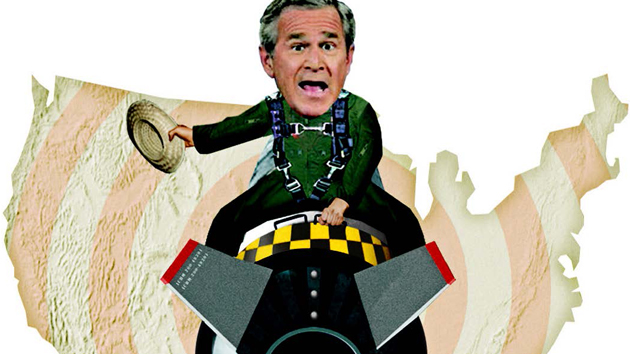
<a href="https://www.flickr.com/photos/worldeconomicforum/">World Economic Forum</a>/Flickr
This past weekend, as the crisis in Iraq intensified, Paul Wolfowitz appeared on Meet the Press to share his wisdom on the current predicament there. Wolfowitz was the deputy defense secretary and an architect of the US invasion of Iraq during the Bush-Cheney administration, and he remarked on the show that talk of sectarian violence in Iraq was misguided: “This is more than just those obscure Shia/Sunni conflict[s].” He advised that the United States should “stick with our friends, and those friends are not always perfect.” Wolfowitz seemed to be suggesting that the Obama administration should stand strong with Iraqi Prime Minister Nouri al-Maliki, despite Maliki’s authoritarian, corrupt, and inept ways. But moments later Wolfowitz said, “It’s a complicated situation in which you don’t just come up with, ‘We’re going to bomb this, we’re going to do that.'” And then he said, “Maliki is a big part of the problem. He’s not a leader of Iraq. We need to find people there.”
It was confusing. After the invasion of Iraq, the Bush crew backed a consolidation of power by the Maliki-led coalition of religious-oriented Shiite parties and decimated the Sunni establishment that had previously controlled the government and the military. And now Wolfowitz was saying that Washington should hang tough with its pal—but that its pal was also the problem. Huh? The big brain behind the Iraq War had nothing of consequence to recommend.
But the real question is, what was he doing on television anyway? Like his neocon comrades—Bill Kristol, Charles Krauthammer, Robert Kagan, and others—Wolfowitz does not deserve to be presented as an expert with important ideas about the ongoing mess. He and the rest of this gang should have had their pundit licenses revoked after the Iraq War. They got it all wrong: WMD, the cost of the war, the consequences of the invasion. And these errors were compounded by the deaths of nearly 4,500 US service men and women—and 180,000 or more civilian Iraqi casualties. (Here’s a partial list of Kristol’s pre-war errors and misrepresentations.) So why care what they have to say now?
Instead, how about a a flashback? It’s February 27, 2003, three weeks before the invasion. As some experts are pointing out that the war could cost a great deal and require the United States to keep hundreds of thousands of troops in Iraq following the cessation of hostilities, Wolfowitz is testifying before Congress. He’s insisting that the United States will not have to maintain large number of troops in Iraq after the war—and he’s refusing to provide a cost estimate. There’s also another critical concern hovering at the time: whether a US invasion will create disorder that will trigger sectarian violence within Iraq. Wolfowitz, long known in Washington as a “defense intellectual,” pooh-poohed the matter and indicated it was silly to fret such an outbreak.
Let’s go to the tape:
There are other differences that suggest that peacekeeping requirements in Iraq might be much lower than historical experience in the Balkans suggests. There’s been none of the record in Iraq of ethnic militias fighting one another that produced so much bloodshed and permanent scars in Bosnia along with the requirement for large policing forces to separate those militias. And the horrors of Iraq are very different from the horrific ethnic cleansing of Kosovars by Serbs that took place in Kosovo and left scars that continue to require peacekeeping forces today in Kosovo. The slaughter in Iraq—and it’s been substantial—has unfortunately been the slaughter of people of all ethnic and religious groups by the regime. It is equal opportunity terror.
That is, no reason to fear Shiite-Sunni bloodshed after a US invasion. Yet in the aftermath of the invasion, such violent conflict began right away. And the Shiite-Sunni strife—exacerbated by the Bush-backed Maliki regime—has led to the crisis of the moment, with the ultra-extremists of the Sunni-led Islamic State in Iraq and Syria (ISIS) having taken control of major Iraqi cities and threatening Baghdad.
At that same congressional appearance, Wolfowitz echoed the Bush-Cheney administration mantra of the time that the United States would be embraced by Iraqis after invading their nation.
These are Arabs, 23 million of the most educated people in the Arab world, who are going to welcome us as liberators. And when the message gets out to the whole Arab world, it’s going to be a powerful counter to Osama bin Laden…It will be a great step forward.
Now, 11 years after that message was supposedly sent to Bin Laden, Wolfowitz says, “Al Qaeda is on the march. Not just in Iraq, in Syria, and Libya.”
A reminder: There was no Al Qaeda on the march in Iraq and this region before the US invasion of Iraq.
In 2003, Wolfowitz clearly did not know what he was talking about regarding sectarian tensions within Iraq—or much else about Iraq and its people and problems. (In our book, Hubris: The Inside Story of Spin, Scandal, and the Selling of the Iraq War, Michael Isikoff and I reported that Wolfowitz at that time embraced an odd and convoluted conspiracy theory that held that Iraqi dictator Saddam Hussein controlled Al Qaeda and was responsible for all of its terrorism.) Wolfowitz is perfectly unqualified to be giving advice about the present situation—even if he helped cause it.






